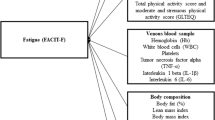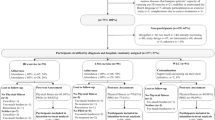Abstract
Purpose
The aim of this study is to examine whether physical fitness of severely fatigued and non-fatigued cancer survivors, as measured by maximal exercise performance, is different between both groups and, if so, whether this difference can be explained by differences in physical activity, self-efficacy regarding the exercise test, and/or social support.
Methods
Severely fatigued (n = 20) and sex- and age-matched non-fatigued (n = 20) disease-free cancer survivors, who completed treatment for a malignant, solid tumor at least 1 year earlier, participated in this case–control study. Maximal oxygen consumption was measured during an incremental cycling exercise test. Physical activity was assessed via actigraphy. Self-efficacy regarding the test and social support were assessed via questionnaires to study its relationship with physical fitness.
Results
Maximal oxygen consumption was significantly lower in fatigued compared to non-fatigued participants. Actual physical activity, self-efficacy regarding the test, and negative interactions of social support were significantly different between both groups. However, after inclusion of these three variables in linear regression analyses, the difference in physical fitness between fatigued and non-fatigued cancer survivors persisted.
Conclusions
Maximal oxygen consumption, a measure for physical fitness, was reduced in severely fatigued compared to non-fatigued cancer survivors. The inferior maximal exercise performance cannot fully be explained by differences in physical activity, self-efficacy, or social support between both groups. Other currently still unknown factors, such as a disturbance in the cardiopulmonary circuit, may play a role.

Similar content being viewed by others
References
Bower JE, Ganz PA, Desmond KA, Rowland JH, Meyerowitz BE, Belin TR (2000) Fatigue in breast cancer survivors: occurrence, correlates, and impact on quality of life. J Clin Oncol 18(4):743–753
Servaes P, Verhagen C, Bleijenberg G (2002) Fatigue in cancer patients during and after treatment: prevalence, correlates and interventions. Eur J Cancer 38(1):27–43
Irvine D, Vincent L, Graydon JE, Bubela N, Thompson L (1994) The prevalence and correlates of fatigue in patients receiving treatment with chemotherapy and radiotherapy. A comparison with the fatigue experienced by healthy individuals. Cancer Nurs 17(5):367–378
Smets EM, Garssen B, Schuster-Uitterhoeve AL, de Haes JC (1993) Fatigue in cancer patients. Br J Cancer 68(2):220–224
Bower JE, Ganz PA, Desmond KA, Bernaards C, Rowland JH, Meyerowitz BE, Belin TR (2006) Fatigue in long-term breast carcinoma survivors: a longitudinal investigation. Cancer 106(4):751–758. doi:10.1002/cncr.21671
Hjermstad MJ, Fossa SD, Oldervoll L, Holte H, Jacobsen AB, Loge JH (2005) Fatigue in long-term Hodgkin's Disease survivors: a follow-up study. J Clin Oncol 23(27):6587–6595. doi:10.1200/JCO.2005.09.936
Nieboer P, Buijs C, Rodenhuis S, Seynaeve C, Beex LV, van der Wall E, Richel DJ, Nooij MA, Voest EE, Hupperets P, Mulder NH, van der Graaf WT, TenVergert EM, van Tinteren H, de Vries EG (2005) Fatigue and relating factors in high-risk breast cancer patients treated with adjuvant standard or high-dose chemotherapy: a longitudinal study. J Clin Oncol 23(33):8296–8304. doi:10.1200/JCO.2005.10.167
Servaes P, Gielissen MF, Verhagen S, Bleijenberg G (2007) The course of severe fatigue in disease-free breast cancer patients: a longitudinal study. Psychooncology 16(9):787–795. doi:10.1002/pon.1120
Servaes P, Verhagen S, Schreuder HW, Veth RP, Bleijenberg G (2003) Fatigue after treatment for malignant and benign bone and soft tissue tumors. J Pain Symptom Manag 26(6):1113–1122
Bartsch HH, Weis J, Moser MT (2003) Cancer-related fatigue in patients attending oncological rehabilitation programs: prevalence, patterns and predictors. Onkologie 26(1):51–57. doi:10.1159/000069864
Dimeo F, Schmittel A, Fietz T, Schwartz S, Kohler P, Boning D, Thiel E (2004) Physical performance, depression, immune status and fatigue in patients with hematological malignancies after treatment. Ann Oncol 15(8):1237–1242. doi:10.1093/annonc/mdh314
Gielissen MF, Schattenberg AV, Verhagen CA, Rinkes MJ, Bremmers ME, Bleijenberg G (2007) Experience of severe fatigue in long-term survivors of stem cell transplantation. Bone Marrow Transplant 39(10):595–603. doi:10.1038/sj.bmt.1705624
Okuyama T, Akechi T, Kugaya A, Okamura H, Shima Y, Maruguchi M, Hosaka T, Uchitomi Y (2000) Development and validation of the cancer fatigue scale: a brief, three-dimensional, self-rating scale for assessment of fatigue in cancer patients. J Pain Symptom Manag 19(1):5–14
Servaes P, van der Werf S, Prins J, Verhagen S, Bleijenberg G (2001) Fatigue in disease-free cancer patients compared with fatigue in patients with chronic fatigue syndrome. Support Care Cancer 9(1):11–17
Smets EM, Visser MR, Willems-Groot AF, Garssen B, Schuster-Uitterhoeve AL, de Haes JC (1998) Fatigue and radiotherapy: (B) experience in patients 9 months following treatment. Br J Cancer 78(7):907–912
Woo B, Dibble SL, Piper BF, Keating SB, Weiss MC (1998) Differences in fatigue by treatment methods in women with breast cancer. Oncol Nurs Forum 25(5):915–920
Gielissen MF, Verhagen S, Witjes F, Bleijenberg G (2006) Effects of cognitive behavior therapy in severely fatigued disease-free cancer patients compared with patients waiting for cognitive behavior therapy: a randomized controlled trial. J Clin Oncol 24(30):4882–4887. doi:10.1200/JCO.2006.06.8270
Irwin ML, Crumley D, McTiernan A, Bernstein L, Baumgartner R, Gilliland FD, Kriska A, Ballard-Barbash R (2003) Physical activity levels before and after a diagnosis of breast carcinoma: the Health, Eating, Activity, and Lifestyle (HEAL) study. Cancer 97(7):1746–1757. doi:10.1002/cncr.11227
Davis MP, Khoshknabi D, Yue GH (2006) Management of fatigue in cancer patients. Curr Pain Headache Rep 10(4):260–269
Velthuis MJ, Agasi-Idenburg SC, Aufdemkampe G, Wittink HM (2010) The effect of physical exercise on cancer-related fatigue during cancer treatment: a meta-analysis of randomised controlled trials. Clin Oncol (R Coll Radiol) 22(3):208–221. doi:10.1016/j.clon.2009.12.005
Perkins HY, Baum GP, Taylor CL, Basen-Engquist KM (2009) Effects of treatment factors, comorbidities and health-related quality of life on self-efficacy for physical activity in cancer survivors. Psychooncology 18(4):405–411. doi:10.1002/pon.1535
Bazelmans E, Bleijenberg G, Voeten MJ, van der Meer JW, Folgering H (2005) Impact of a maximal exercise test on symptoms and activity in chronic fatigue syndrome. J Psychosom Res 59(4):201–208. doi:10.1016/j.jpsychores.2005.04.003
VanNess JM, Stevens SR, Bateman L, Stiles TL, Snell CR (2010) Postexertional malaise in women with chronic fatigue syndrome. J Women's Health (Larchmt) 19(2):239–244. doi:10.1089/jwh.2009.1507
Rogers LQ, Courneya KS, Verhulst S, Markwell S, Lanzotti V, Shah P (2006) Exercise barrier and task self-efficacy in breast cancer patients during treatment. Support Care Cancer 14(1):84–90. doi:10.1007/s00520-005-0851-2
Hsu HT, Dodd MJ, Guo SE, Lee KA, Hwang SL, Lai YH (2011) Predictors of exercise frequency in breast cancer survivors in Taiwan. J Clin Nurs 20(13–14):1923–1935. doi:10.1111/j.1365-2702.2010.03690.x
Servaes P, Verhagen S, Bleijenberg G (2002) Determinants of chronic fatigue in disease-free breast cancer patients: a cross-sectional study. Ann Oncol 13(4):589–598
Taylor HL, Buskirk E, Henschel A (1955) Maximal oxygen intake as an objective measure of cardio-respiratory performance. J Appl Physiol 8(1):73–80
Dittner AJ, Wessely SC, Brown RG (2004) The assessment of fatigue: a practical guide for clinicians and researchers. J Psychosom Res 56(2):157–170. doi:10.1016/S0022-3999(03)00371-4
Vercoulen JH, Swanink CM, Fennis JF, Galama JM, van der Meer JW, Bleijenberg G (1994) Dimensional assessment of chronic fatigue syndrome. J Psychosom Res 38(5):383–392
Gielissen MF, Verhagen CA, Bleijenberg G (2007) Cognitive behaviour therapy for fatigued cancer survivors: long-term follow-up. Br J Cancer 97(5):612–618. doi:10.1038/sj.bjc.6603899
van der Werf SP, Prins JB, Vercoulen JH, van der Meer JW, Bleijenberg G (2000) Identifying physical activity patterns in chronic fatigue syndrome using actigraphic assessment. J Psychosom Res 49(5):373–379
Vercoulen JH, Bazelmans E, Swanink CM, Fennis JF, Galama JM, Jongen PJ, Hommes O, Van der Meer JW, Bleijenberg G (1997) Physical activity in chronic fatigue syndrome: assessment and its role in fatigue. J Psychiatr Res 31(6):661–673
van Sonderen E (1993) Het meten van sociale steun met de Sociale Steun Lijst - Interacties (SSL-I) en Sociale Steun Lijst - Discrepancies (SSL-D), een handleiding. Noorderlijk Centrum voor Gezondheidsvraagstukken, Groningen
Goedendorp MM, Peters ME, Gielissen MF, Witjes JA, Leer JW, Verhagen CA, Bleijenberg G (2010) Is increasing physical activity necessary to diminish fatigue during cancer treatment? Comparing cognitive behavior therapy and a brief nursing intervention with usual care in a multicenter randomized controlled trial. Oncologist 15(10):1122–1132. doi:10.1634/theoncologist.2010-0092
Gielissen MF, Wiborg JF, Verhagen CA, Knoop H, Bleijenberg G (2012) Examining the role of physical activity in reducing postcancer fatigue. Support Care Cancer 20(7):1441–1447. doi:10.1007/s00520-011-1227-4
Bhagwat M, Paramesh K (2010) Cardio-pulmonary exercise testing: An objective approach to pre-operative assessment to define level of perioperative care. Indian J Anaesth 54(4):286–291. doi:10.4103/0019-5049.68369
Vermeulen RC, Kurk RM, Visser FC, Sluiter W, Scholte HR (2010) Patients with chronic fatigue syndrome performed worse than controls in a controlled repeated exercise study despite a normal oxidative phosphorylation capacity. J Transl Med 8:93. doi:10.1186/1479-5876-8-93
Bazelmans E, Bleijenberg G, Van Der Meer JW, Folgering H (2001) Is physical deconditioning a perpetuating factor in chronic fatigue syndrome? A controlled study on maximal exercise performance and relations with fatigue, impairment and physical activity. Psychol Med 31(1):107–114
Acknowledgments
We thank all patients who participated in this study, all physicians for referring patients, Lianne Vermeeren for assistance with data collection, and Bregina Hijmans-Kersten and Linda Pardoel for technical support and helpful advice.
Role of the funding source
This work was supported by the Dutch Cancer Society [KUN 2008-4002], but it was not involved in the study design; in the collection, analysis, and interpretation of data; in the writing of the manuscript; and in the decision to submit the manuscript for publication.
Conflict of interest
The corresponding author and the coauthors have no conflicts of interest to declare. We allow the journal to review our data if requested.
Author information
Authors and Affiliations
Corresponding author
Translation self-efficacy questionnaire, Dutch → English
Translation self-efficacy questionnaire, Dutch → English
-
1.
Dit onderzoek zal me wel lukken.
→ I will be able to do this test.
-
2.
Ik heb me goed voorbereid op deze dag.
→ I prepared well for this day.
-
3.
Ik zie tegen het onderzoek op.
→ I am reluctant to do this test.
-
4.
Het zal een grote inspanning voor mij zijn.
→ This will be an intensive exercise for me.
-
5.
Ik denk dat ik moeite zal hebben om dit onderzoek te voltooien.
→ I think I will find it difficult to complete this test.
-
6.
Ik weet niet of ik me volledig kan inspannen tijdens dit onderzoek.
→ I don't know if I can fully exert myself during this test.
-
7.
Ik verwacht dat ik de opdrachten goed kan uitvoeren.
→ I expect that I can fulfill these assignments well.
-
8.
Ik heb de afgelopen dagen extra veel rust genomen voor dit onderzoek.
→ I have taken extra rest over the last few days for this test.
-
9.
Ik ga me volledig inzetten.
→ I will apply myself fully.
Rights and permissions
About this article
Cite this article
Prinsen, H., Hopman, M.T.E., Zwarts, M.J. et al. Maximal exercise performance in patients with postcancer fatigue. Support Care Cancer 21, 439–447 (2013). https://doi.org/10.1007/s00520-012-1531-7
Received:
Accepted:
Published:
Issue Date:
DOI: https://doi.org/10.1007/s00520-012-1531-7




